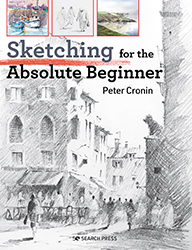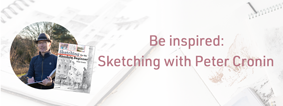
Peter Cronin is back with his brand new book in the best-selling Absolute Beginner series, Sketching for the Absolute Beginner which is a must-have book for anybody who is eager to take their sketching skills to the next level.
Peter's has built up a reputable career spanning over 30 years as a professional artist who his known for his watercolour and oil painting and is also a member of several art societies including Royal Society of Marine Artists (RSMA), the Royal Watercolour Society of Wales and the Pure Watercolour Society.
We caught up with Peter to hear about his new book, his passion for sketching and his involvement in The Royal Society of Marine Artists.
How are you Peter?
I am fine, and thankfully busy.
Can you tell us a little about yourself?
I am a traditional artist, painting in both watercolour and oil.
I am a member of the Royal Watercolour society of Wales, the Pure Watercolour Society, and the Royal Society of Marine Artists.
As a boy I fell in live with the natural environment and as I grew the urge to respond to these emotions in pencil and paint grew stronger. Over the years the subject matter has broadened to include city and townscapes as well as a hefty portion of marine subject matter; but it is still the light and atmosphere of the great outdoors that drives the urge to paint.
I have a background in structural engineering, but I been a full time artist for nearly twenty years now. I am self-taught and have no formal art education.
What inspired you to write your new book, Sketching for the Absolute Beginner?
The sketchbook and pencil is the most basic of tools and I am so grateful that my Dad used to buy me a sketchbook each Christmas.
The Sketching for the Absolute Beginner book came about due to my years of teaching students how to ‘really look’ and how to ‘see like a pencil’. It equips the artist with methods that are simple to understand and execute. I have deliberately avoided technical and complex explanations for what is essentially, at its basic level, a simple process of identifying both what you wish to say and how to say it.
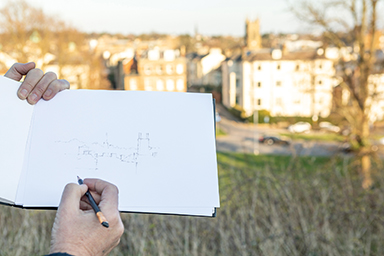
What it is about sketching you like the most?
I started my fumblings with paint using watercolour due to its transparency and one hit nature. I soon realised the importance of being able to draw easily and accurately – virtually all my peers in the RSMA have this ability. There is, of course, nothing as obvious as a badly drawn boat. But this ability to draw doesn’t mean that you have to become a super realist, it makes impressionist shapes work too, because if you are suggesting a shape, then it has to be the right marks to convey the image. If I was to name one thing that has improved my art, then it would be drawing. It’s so satisfying to be able to say what you want to say when you want to say it, and with the time constraints or working outside it's imperative also.
I have now been painting for nearly 40 years, and still, one of my favourite working methods is to get out in nature, in all weathers, with a sketchbook, a flask of hot coffee, and a pack of sandwiches. I love the natural world, and though our wanton destruction of it pains me greatly, it’s still the environment in which I am most happy.
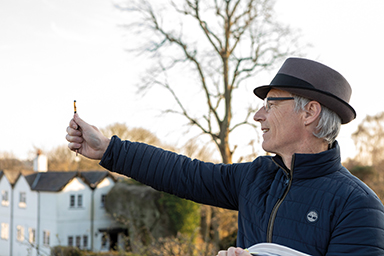
What are your favourite mediums to use in your artwork?
I am primarily a watercolourist, though of late there has been an equal split between oil and watercolour. I absolutely love the flow and transparency of watercolour and I paint in the traditional way with no gimmicks or playing about. Pure watercolour on good quality paper is beautiful in its own right. I also love the richness and buttery quality of oil paint, and it is a good companion to watercolour as they are totally opposite in their application and feel. I like to paint my oils in one sitting of around three hours maximum, and I may touch up the odd thing once the first hit has dried sufficiently.
Of all of the locations you have visited, where is your favourite place to sketch and paint?
As mentioned previously, I love the outdoors and I am primarily a landscape/townscape artist, with a large dose of marine thrown in. Any location is good if the lighting and weather are right. I am not a big fan of summer due to the excess of greens and the effect of the heat on the watercolour process. As long as the shapes compose nicely and there is a perceivable mood to the day, then I am happy to paint away, though I do seem to be becoming increasingly fussy as to what makes a good composition.
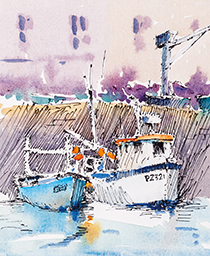
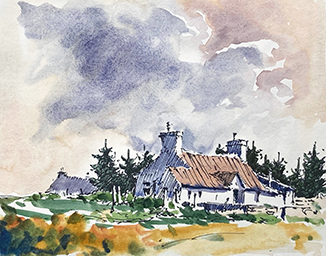
_copy.jpg)
You’re also a member of The Royal Society of Marine Artists, could you tell us more about the organization and your involvement.
The Royal Society of Marine Artists (RSMA) is widely recognized as the focal point for much of Britain's finest contemporary marine art and many of the country's leading marine artists are elected members of the Society.
You have to submit for a number of years and you are elected, first as an associate, and then as a member by the artist members of the society. I am currently on the council which means that I get involved with selection and hanging for the annual exhibition etc. Some of my favourite artists belong to the RSMA.
Are you currently working on anything at the moment?
The Covid pandemic placed everything on hold regarding galleries and teaching, so it's good to see this side of things picking up once again and the diary is filling nicely, which makes the income stream secure. Painting wise, I have never been keener. The new work that I am painting is really exciting me and that of course is the joy of painting. You never get there, but the journey becomes more and more exhilarating. I think that having my family, my art, my guitar and what's lefy of the natural world around me, makes me a very lucky man, and I can smile about that.
Sketching for the Absolute Beginner is available from Search Press, RRP £12.99.
